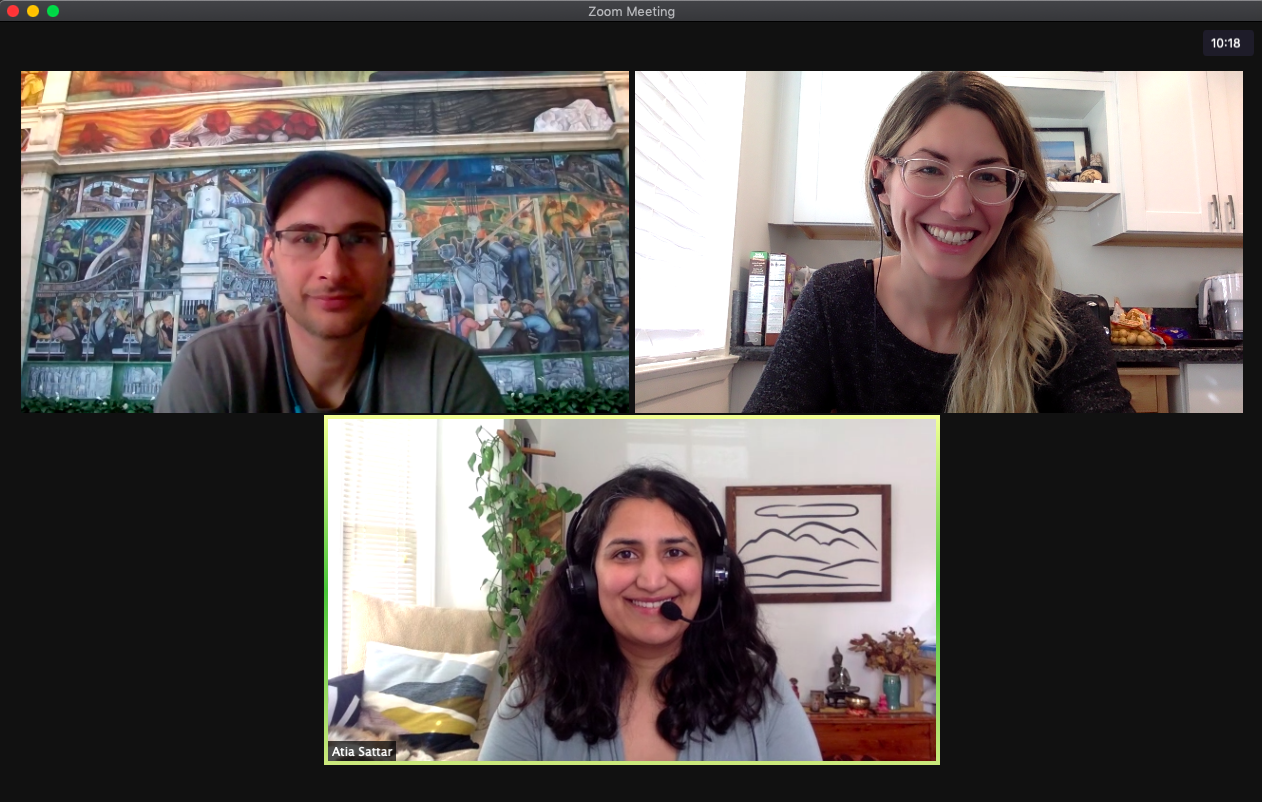In Episode 52, we talk to USC faculty member Dr. Atia Sattar about the power of meditation groups and affinity spaces for people of color, how storytelling and the acknowledgement of our embodied experiences empowers both students and faculty, and the importance of community for creating a humanized academic experience.

Atia Sattar is Assistant Professor (Teaching) in the Writing Program and the Department of Gender and Sexuality Studies. Her interdisciplinary research areas include Medical Humanities; Science and Technology Studies; and Gender, Race, and Health. Atia has studied mindfulness since 2013 and leads the Mindful USC BIPOC Meditation Practice Group which she established in 2018. She has published articles on laboratory notebooks, public health campaigns, and cochlear implants in such scholarly publications as The Journal of Medical Humanities, Isis, and Configurations. Her writings on meditation and mindfulness have been published in the Cambridge Quarterly of Health Care Ethics and Tricycle: A Buddhist Review.
People, Texts, and Organizations Mentioned in the Episode
Some links may be affiliate links, which at no additional cost to you help to fund The Writing Remix. As an Amazon Associate, I earn from qualifying purchases.
- BIPOC Meditation Group with Atia Sattar and Stephanie Renée Payne
- Spirit Rock Meditation Center
- Stephanie Renée Payne
- Rhonda V. Magee
- The Inner Work of Racial Justice: Healing Ourselves and Transforming Our Communities Through Mindfulness
- The Nap Ministry
- Tricia Hersey
- Atia Sattar’s work in Tricycle
- Ruth King
- “Should Writers Use They Own English?”
- Mindful of Race: Transforming Racism from the Inside Out
“There’s a lot of racial trauma around being a Pakastani immigrant post-9/11.” -Atia Sattar
Tweet
“I found that the spaces that I was in that were integrated meditation spaces were spaces where I didn’t feel like I could safely hold my trauma.” -Atia Sattar
Tweet
“One of the things that is true, or that can be true, rather, of meditation spaces–but also I think is true in an academic context too, in the way that it has us deny who we are and become this disembodied scholar–is I felt like there was a lot of spiritual bypass, or this sense that if I really wanted to not be suffering I had to get over my race, and that there was not really much accounting for what it meant to be in the world in this body.” -Atia Sattar
Tweet
“I was surprised that […] while there were meditation spaces at USC, there was no space for people of color–faculty, students, or staff–and I wanted to create a space where we could just get together and hold space for one another and just breathe that sigh of relief that happens when you’re in such affinity spaces.” -Atia Sattar
Tweet
“One of the things I’ve been thinking about a lot is: what is my purpose?” -Atia Sattar
Tweet
“For those of us who are scholars and educators, if you want to do this scholarly or rhetorical work of so-called emancipation or decolonization, you have to emancipate yourself. Start with yourself.” -Atia Sattar
Tweet
“[Emancipating yourself] is not something you can just intellectually sort through because this is part of our experiences. It lives in our body.” -Atia Sattar
Tweet
“Our experiences of race, of trauma, of our intersectional identities are all embodied.” -Atia Sattar
Tweet
“Being aware of where I’m coming from and being able to notice when my biases are coming up or when I’m tightening or when my voice is tensing–I’ve learned through my practice that that’s when I can kind of pause and ask myself what’s going on before I react or before I put it on my students.” -Atia Sattar
Tweet
“I want [my students] to think about their own bodies and minds as a site of knowledge production.” -Atia Sattar
Tweet
“Telling stories and experimenting with genre is not just for marginalized communities […] because everyone is being denied of telling their stories or being denied of this context to really get to know where you’re coming from and to know what you have to give.” -Atia Sattar
Tweet
“The work to racial justice […] starts with knowing the self because that’s where the change has to be.” -Atia Sattar
Tweet
“How do you not center your guilt, but instead center your transformation?” -Atia Sattar
Tweet
“Even if you look at health research, whiteness is a category that goes uninterrogated […] How does race stand in as a proxy for other things?” -Atia Sattar
Tweet
“Students notice this stuff. They just feel like they just have to suck it up, and I think we have to make it comfortable for them to speak up somehow.” -Atia Sattar
Tweet
“You can’t just plunk [anti-racist] pedagogy onto what you’re doing. It can actually cause more harm if you don’t recognize what’s within you.” -Atia Sattar
Tweet
“I think part of the problem here […] is that there’s this metrics of individual evaluation when we can’t actually do this work alone and it has to be done in community […] We have to be able to create safe spaces for each other [as faculty] so that we can do the work.” -Atia Sattar
Tweet
“And I think that’s also a problem that happens in the western appropriation of eastern practices such as meditation, they become individualized, and it’s as though you’re supposed to attain self-realization in a vacuum by yourself. It does not work that way.” -Atia Sattar
Tweet
“I think it’s okay to go to your students and ask for forgiveness.” -Atia Sattar
Tweet
This episode was recorded on February 15, 2021. Because we recorded via Zoom, there may be occasional audio hiccups. Our theme song is “4 am” by Makaih Beats. You can subscribe to the podcast on Apple Podcasts, Spotify, and Stitcher and follow us on Twitter @WritingRemixPod.

